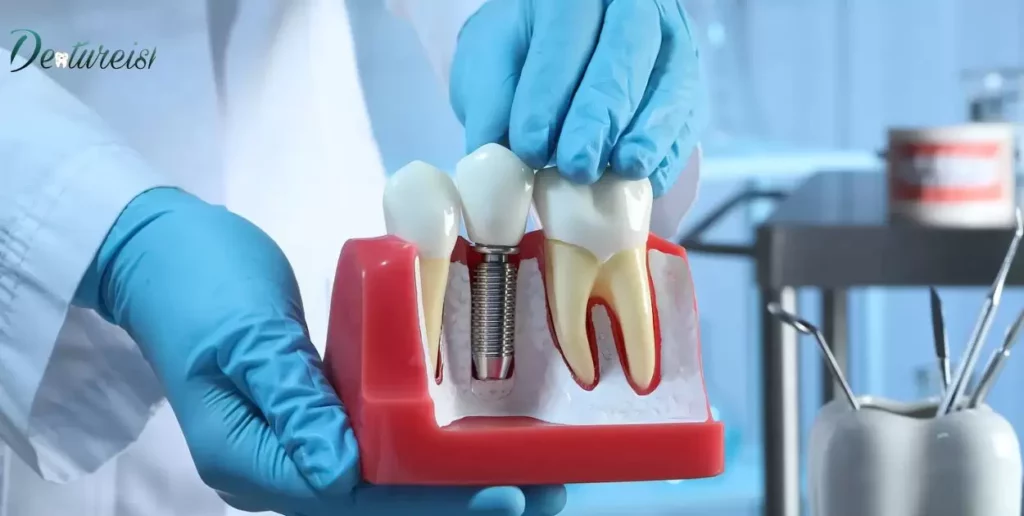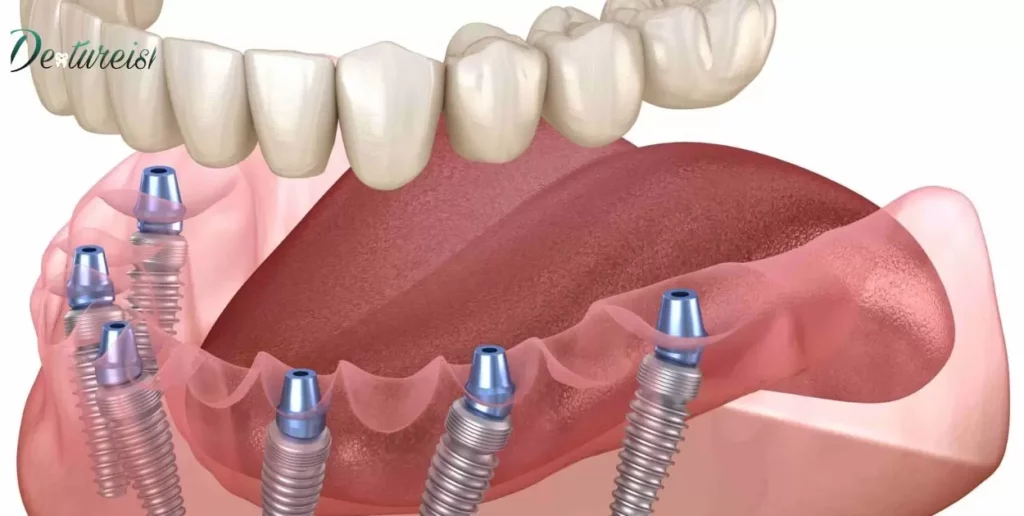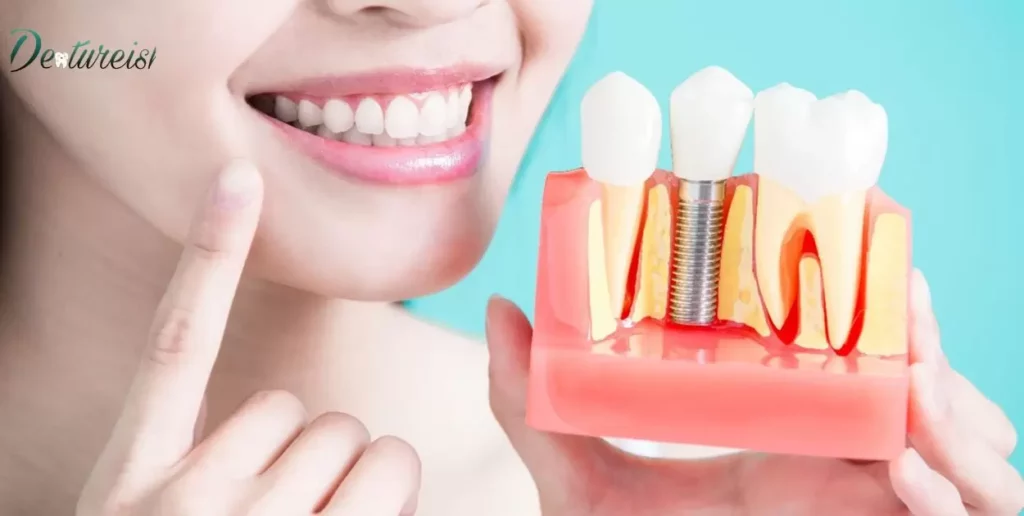Getting implants after dentures involves securing artificial tooth roots into the jawbone to anchor dentures securely. This enhances stability, comfort, and restores natural chewing function, improving overall oral health and quality of life.
Are you tired of the hassles of loose dentures affecting your daily life? Wondering, ‘Can I get implants after dentures Discover a world of renewed confidence and comfort. Explore the transformative journey to secure, permanent smiles. It’s time to embrace the possibilities – take the first step toward a life without denture woes!
Absolutely! You can get implants after dentures. This process involves securing artificial tooth roots into the jawbone, offering enhanced stability and a natural feel. Experience improved confidence and comfort with the possibility of a permanent solution for your smile.
Can You Wear Dentures While Implants Are Healing
You can wear dentures while your implants are healing. Dentures provide a temporary solution, ensuring you can eat and speak comfortably during the recovery period. It’s important to follow your dentist’s guidelines for proper care and maintenance to support successful healing and the eventual transition to implants.
Regular check-ups will help monitor progress and determine when it’s appropriate to switch to permanent implants. Remember, wearing dentures during healing is a practical option to maintain normal daily activities while awaiting the final implant restoration.
Understanding Dentures as a Tooth Replacement Option
Dentures are a popular option for replacing missing teeth. Dentists create custom dentures to fit comfortably in your mouth. These removable appliances improve chewing ability and restore a natural-looking smile.
There are two main types of dentures: complete and partial. Complete dentures replace all teeth, while partial dentures replace only a few missing teeth. Dentures provide an affordable and efficient solution for those seeking to restore their oral function and appearance.
Challenges Faced with Traditional Dentures
Traditional dentures pose several challenges for wearers. They often slip or shift during eating or talking, causing discomfort and embarrassment. Maintenance can be tricky, as cleaning and adhesive application become daily tasks.
Traditional dentures may lead to diminished taste sensation and difficulty in pronouncing certain words. These challenges highlight the need for more innovative and comfortable dental solutions.
Exploring Dental Implants as an Alternative
Discover a viable alternative with dental implants. These implants serve as durable replacements for missing teeth, offering a natural look and feel. Dentists commonly recommend them to enhance both appearance and oral functionality.
Choosing dental implants involves a straightforward process. The dentist bolds Dentures More Comfortable surgically places the implant into the jawbone, providing a stable foundation for the replacement tooth. With their durability and realistic appearance, dental implants stand out as a reliable option for those seeking an effective solution to tooth loss.
Benefits of Choosing Implants After Dentures
- Enhanced Stability: Opting for implants after dentures ensures a more stable and secure fit. Implants anchor firmly to the jawbone, preventing slipping or discomfort commonly associated with traditional dentures.
- Improved Chewing Ability: Dental implants provide a strong foundation for replacement teeth, allowing for better chewing functionality. This enables individuals to enjoy a wider variety of foods without the limitations often experienced with removable dentures.
- Natural Look and Feel: Implants closely mimic the appearance and feel of natural teeth. They blend seamlessly with existing teeth, enhancing the overall aesthetic and boosting confidence in one’s smile.
- Long-Term Durability: Unlike dentures that may need frequent adjustments or replacements, dental implants offer long-lasting durability. With proper care, they can endure for many years, providing a reliable and sustainable solution for tooth replacement.
- Preservation of Jawbone: Dental implants stimulate the jawbone, preventing the bone loss that can occur over time with dentures. This helps maintain facial structure and prevents the sunken look that may occur with traditional removable dentures.
Dental Implants For Denture Wearers
Many denture wearers choose dental implants for a more secure fit. Dentists place small titanium posts into the jawbone, providing a strong foundation. These implants support the dentures, allowing wearers to eat, speak, and smile with confidence.
Unlike traditional dentures, dental implants for denture wearers offer stability and prevent slippage. Patients experience improved comfort and a natural feel, boosting their overall quality of life. The process involves a minor surgery, but the long-term benefits make it a popular choice for those seeking a reliable and permanent solution to denture-related challenges.
Assessment of Candidacy for Dental Implants

Determining eligibility for dental implants involves a thorough assessment of a patient’s oral health. Dentists examine the condition of the gums and bone structure to ensure they can support the implant. X-rays are used to assess bone density and identify any potential issues.
The patient’s overall health is considered, as certain medical conditions may affect the success of the implant. The assessment process is crucial in identifying suitable candidates and ensuring a successful and long-lasting outcome for dental implant procedures.
Consultation with a Dental Professional
When you need dental advice, talk to a dental professional. They will answer your questions and provide guidance on oral health. Schedule a consultation for personalized care and expert recommendations.
During the consultation, the dental professional examines your teeth and discusses any concerns you may have. They offer solutions and help create a plan for maintaining a healthy smile. Choose regular consultations for proactive dental care and a confident, happy mouth.
Comparing Implants to Other Tooth Replacement Options
When choosing a tooth replacement option, many consider implants and dentures. Implants are like sturdy anchors for artificial teeth, securely placed in the jawbone. They provide a natural feel and durability that traditional dentures may lack.
On the other hand, dentures are removable replacements for missing teeth, often requiring adhesives. While they’re more affordable, they might not offer the same stability as implants. It’s essential to weigh the pros and cons to make an informed decision about the most suitable tooth replacement option for your needs.
Preparation and Planning for Implant Surgery
When getting ready for implant surgery denture, careful preparation and planning are crucial. Dentists will assess your oral health and create a tailored plan for the procedure. This involves choosing the right type of implants, ensuring proper healing time, and discussing post-surgery care to guarantee a successful outcome.
During the planning phase, the dentist will consider factors such as your bone density, overall health, and any pre-existing dental issues. This proactive approach ensures a smoother implant surgery process and improves the chances of a comfortable and effective denture implantation.
The Implant Placement Procedure
The Implant Placement Procedure for dentures involves a skilled dentist carefully inserting small titanium posts into the jawbone. These posts act as sturdy anchors for the dentures, providing stability and support.
During the procedure, the dentist attaches the dentures securely to the implanted posts, creating a secure and natural-looking fit. Patients often experience improved comfort, functionality, and confidence with their dentures after undergoing this implant placement procedure.
Can You Get Implants With Bone Loss
If you have bone loss, getting implants might be challenging. Dentists usually need a solid foundation for implants. When bone loss occurs, they may recommend procedures like bone grafting to build up the support needed for successful implant placement.
In some cases, dental implants can still be possible with bone loss, but it depends on the extent of the loss. Your dentist will assess your specific situation and discuss available options to help you achieve a healthy and functional smile.
Recovery Process After Implant Surgery
After implant surgery for dentures, your recovery begins. You may experience some discomfort, but it’s temporary. Follow your dentist’s instructions, take prescribed medications, and rest for a smooth recovery.
Focus on maintaining good oral hygiene during this time. Gently clean your mouth, avoid hard foods, and attend follow-up appointments. With proper care, you’ll soon enjoy the benefits of your new dentures, enhancing your smile and overall well-being.
Potential Risks And Complications
Wearing dentures may pose potential risks and complications. These issues can include soreness and discomfort, especially during the initial adjustment period. Regular check-ups with a dentist are essential to address any fitting issues promptly.
In some cases, dentures might cause difficulties in speaking or eating, requiring patience and practice to overcome. Additionally, poor oral hygiene with dentures can lead to infections or irritation of the gums.
Follow-up Care and Maintenance
After getting dentures, it’s crucial to stay on top of follow-up care and maintenance. Regular check-ups with your dentist are essential to ensure a proper fit and address any adjustments needed for comfort and functionality.
Daily cleaning is also key – brush your dentures with a soft-bristle brush and mild soap, and soak them overnight in a denture solution. By staying diligent with follow-up care and maintenance, you can enjoy the benefits of your dentures for a longer time, promoting oral health and overall well-being.
Cost Considerations for Implants After Dentures

When choosing implants after dentures, cost is a crucial factor. Implants can be expensive, including the surgery and the implant itself. Patients should carefully evaluate the overall expenses and consider if it aligns with their budget.
It’s important to note that implant costs may vary based on factors such as the number of implants needed and the type of materials used. Consulting with a dentist and discussing the financial aspects beforehand can help individuals make an informed decision about the feasibility of opting for implants after dentures.
Insurance Coverage for Implant Procedures
Insurance companies often cover implant procedures for dentures. They provide financial support for the costs associated with getting dental implants. These policies ensure that individuals can afford and access this beneficial solution for better oral health.
When opting for denture implantation, it’s crucial to check your insurance coverage. Confirm that your plan includes these procedures to minimize out-of-pocket expenses. Understanding your insurance can help you make informed decisions about your dental care and overall well-being.
When Is It Too Late To Get Dental Implants
Wondering when to consider dental implants? It’s best not to wait too long. Dental implants are most successful when done soon after tooth loss. The longer you wait, the more bone loss can occur, making the procedure more complex.
If you’re missing teeth, don’t delay discussing implants with your dentist. Acting promptly increases the chances of a successful and smoother implant process, ensuring a healthier and more confident smile.
Success Stories of Implants Post Dentures

Denture wearers often face challenges, but dental implants bring success stories. Patients experience improved confidence and comfort after transitioning from dentures to implants. Smiles become brighter, and daily activities are no longer hindered by the inconvenience of removable dentures.
Implants offer a permanent solution, restoring not just teeth but also self-esteem. The success stories of those who opt for implants post-dentures showcase a life-changing transformation, highlighting the effectiveness and long-lasting benefits of this dental innovation.
Common Misconceptions About Implants
| Misconception | Reality |
| Implants are only for the elderly. | Implants can benefit individuals of all ages. |
| Dental implants are painful and risky. | Modern techniques ensure a comfortable process. |
| Implants are prohibitively expensive. | Costs vary, and long-term benefits justify them. |
| Only those with perfect oral health can get implants. | Implants can be considered for various cases. |
| Implants require excessive maintenance. | Routine oral care is usually sufficient. |
This table aims to debunk common misconceptions surrounding dental implants, providing a clearer understanding of their accessibility, comfort, cost, eligibility, and maintenance requirements.
Can You Get Dental Implants If You Have No Teeth
You can get dental implants even if you have no teeth. Dental implants are a modern solution for tooth loss. The procedure involves attaching artificial teeth directly to the jawbone, providing a durable and natural-looking alternative for individuals with missing teeth.
First, the dentist evaluates your oral health to determine if you are a suitable candidate. Then, small titanium posts are surgically placed into the jawbone, serving as sturdy anchors for the replacement teeth. This process can restore your smile and improve overall oral function, giving you a more permanent and comfortable solution compared to traditional dentures.
Patient Testimonials and Experiences
Patients who have opted for dentures share their positive experiences. They praise the comfort and natural feel of the dentures, highlighting the improved functionality of their smiles. These testimonials reflect the satisfaction and confidence restored through denture solutions.
In the realm of denture experiences, patients consistently express gratitude for the personalized care received. The testimonials underscore the expertise of the dental team and emphasize the seamless transition to a life with enhanced oral comfort.
How Much Do Snap-In Denture Implants Cost
Snap-in denture implants cost varies depending on factors like location, materials used, and dentist fees. On average, expect to pay between $3,000 to $5,000 per arch for snap-in denture implants. Prices may increase if additional procedures or higher-quality materials are chosen.
Factors influencing the cost include the type of dental implants, the number of implants needed, and any preliminary treatments required. Patients should consult with their dentist for a personalized estimate based on their specific needs and circumstances.
Frequently Asked Question
Can you add implants to existing dentures?
Yes, Implants can be added to existing dentures to enhance stability and support. This process involves attaching special attachments to the denture, allowing it to securely snap onto dental implants.
Are dental implants good over dentures?
Yes, dental implants are generally considered better than dentures as they provide a more stable and permanent solution for tooth replacement. Implants also offer improved chewing efficiency and prevent bone loss in the jaw.
Do you get dentures while waiting for implants?
Yes, temporary dentures can be provided while waiting for implant placement. These interim dentures help maintain oral function and aesthetics during the healing period before the permanent implants are installed.
Is it easier to eat with dentures or implants?
Eating is generally easier with dental implants compared to traditional dentures. Implants provide greater stability, allowing for a more natural and secure chewing experience.
Conclusion
Dental implants offer a reliable solution for those seeking enhanced stability and comfort in comparison to traditional dentures. The implant option significantly improves the overall eating experience, providing individuals with greater confidence in their daily activities.
For those who have previously worn dentures, the question often arises: Can I get implants after dentures? The answer is affirmative – individuals can explore the option of transitioning from dentures to dental implants, benefiting from improved functionality and a more natural feel. Consulting with a dentist can provide personalized insights into the feasibility and advantages of making this transition.

